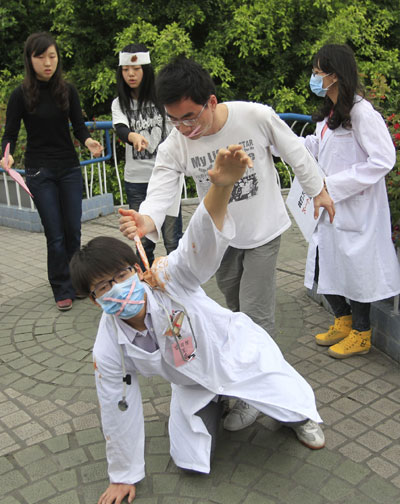Students' performance looks at doctor's slaying
Updated: 2012-03-30 23:37
By Xu Jingxi in Guangzhou(chinadaily.com.cn)
|
|||||||||||
|
 |
|
Students put on an art show featuring a patient stabbing a doctor on a pedestrian overpass in Guangzhou on Friday. [Photo/Zou Zhongpin/China Daily] |
Eight medical students put on a behavioral art show on a busy pedestrian overpass in Guangzhou on Friday to mourn Wang Hao, the doctor who was killed by a teenager patient surnamed Li in a Harbin hospital a week ago.
One student, playing Wang and wearing a white coat and name card, went down on one knee and "bled" with ketchup. Another student played the patient and "stabbed" the doctor's back with a fake knife made of paper.
Both students wore masks with a big cross on them. They remained motionless in the poses for about 10 minutes. Then they took off their masks, the patient gave the doctor a red carnation and they embraced.
It's a tradition in Western countries for patients to give red carnations to doctors to show respect and gratitude on March 30 every year, Doctor's Day.
"The big cross on the mask symbolizes the cause of the tragedy — the lack of communication between patients and doctors," said the 22-year-old student, surnamed Tang, who played the doctor.
Tang, a third-year college student majoring in clinical medicine, said that he was saddened by Wang's tragedy.
"I believe that most doctors care for patients and most patients believe in doctors," Tang said. "But we feel the need for better communication between doctors and patients."
Wang was killed on March 23.
Although the incident is still being investigated, Li confessed that he was unhappy with the treatment he had received at the hospital.
Li made repeated visits to the hospital before he was diagnosed with tuberculosis and a chronic form of arthritis that mainly affects the lower back. He was then told that he would need to get treatment at a specialist tuberculosis clinic before the hospital would treat his back. He left the hospital in a rage, only to return wielding a knife, attacking people at random.
On Friday, one of the performers held a board and asked passers-by to write down their feelings after hearing of Wang's tragedy. Forty-six out of 72 participants wrote "angry", 24 "sad" and two "sympathetic".
Zhai Wansong, 38, wrote "sad". He has been running back and forth between home and the hospital for two months seeking treatment for lymphoma.
He complained that it costs time and money to see a doctor. "We often have to wait in long lines, but we're really anxious to get cured. And doctors can't don't have the time or energy to explain the disease to the patient in detail," Zhai said.
"That type of situation can easily trigger a conflict."
Deng Ke, a third-year dental student, stopped to the behavioral art performance and applauded the pair's boldness and creativity in making medical students' voices heard.
"Like many medical students, I have the ideal of healing the wounded and rescuing the dying. But my passion is being cooled by the conflicts between doctors and patients in recent years," Deng said.
The Ministry of Health issued a document on Tuesday that requires hospitals to carry out security supervision around the clock.
In February, the city of Dongguan, Guangdong province, issued a document that allows hospitals to arm doctors with helmet, pepper spray and a stick. Hospitals where conflicts between doctors and patients are common can also station a police office on the premises.
"It's good to improve doctors' protection. But what's more important is to speed up medical reforms to make it no longer difficult to get medical care," Deng said.
"And it's also useful to spread basic knowledge of medical care among the general public, so that a patient won't carelessly think that a doctor is not trying his best to help," Deng added.
The student playing the patient in the performance will intern at a hospital in the next school year. "I'm ready to test my communicating skills with patients and improve them," said the 22-year-old student surnamed Qiu. "Communication skills are as important as professional skills for a doctor."